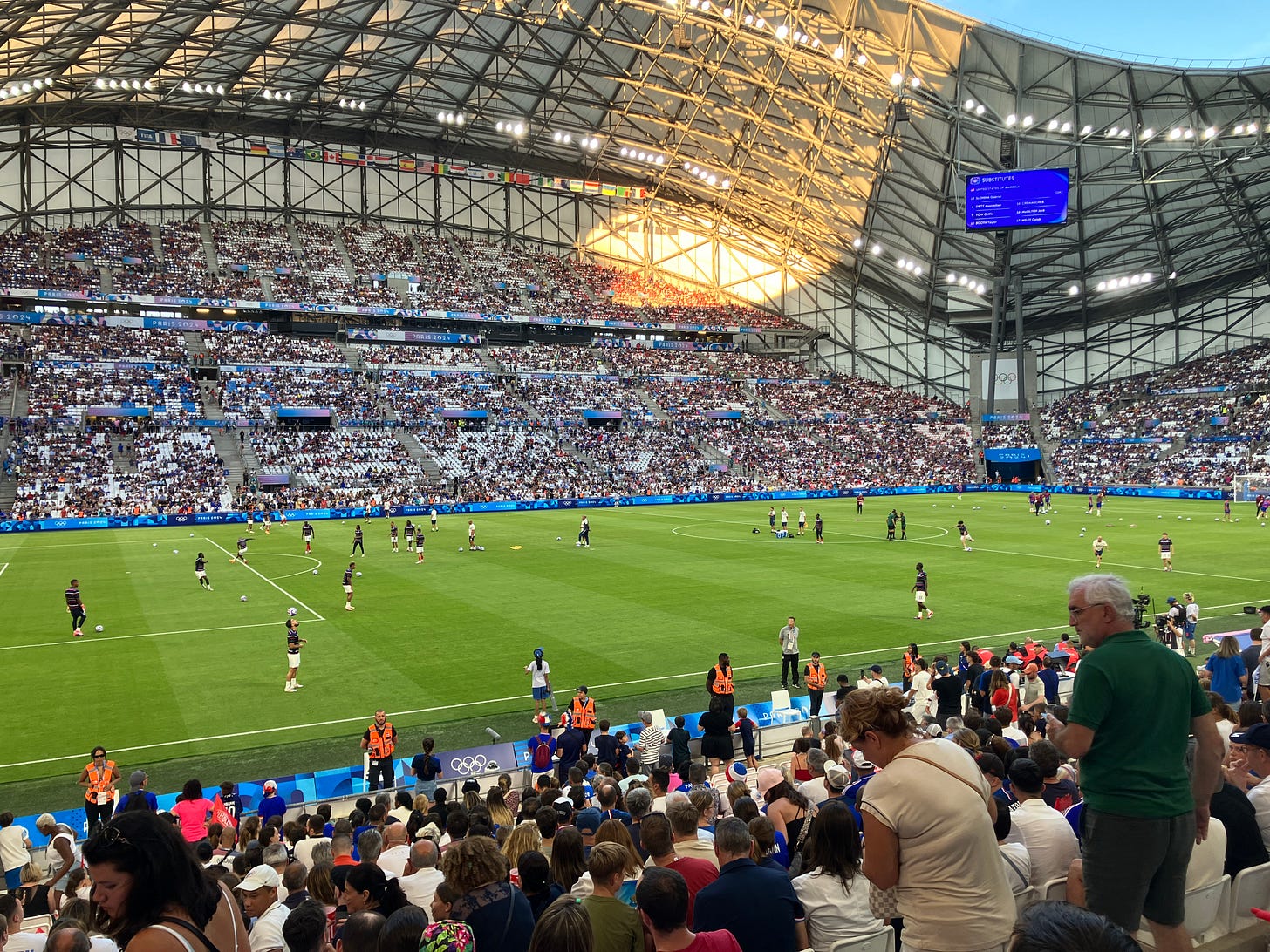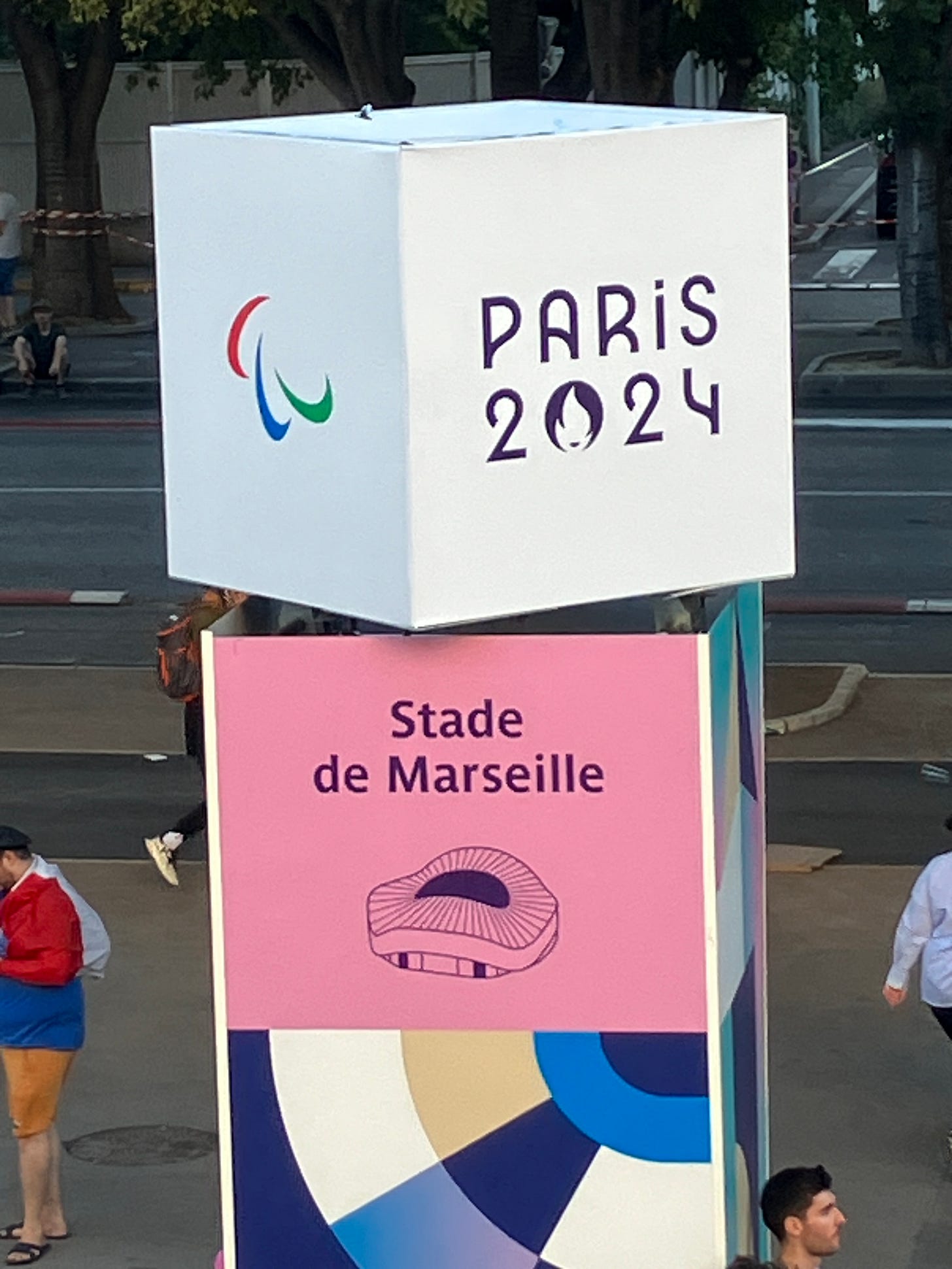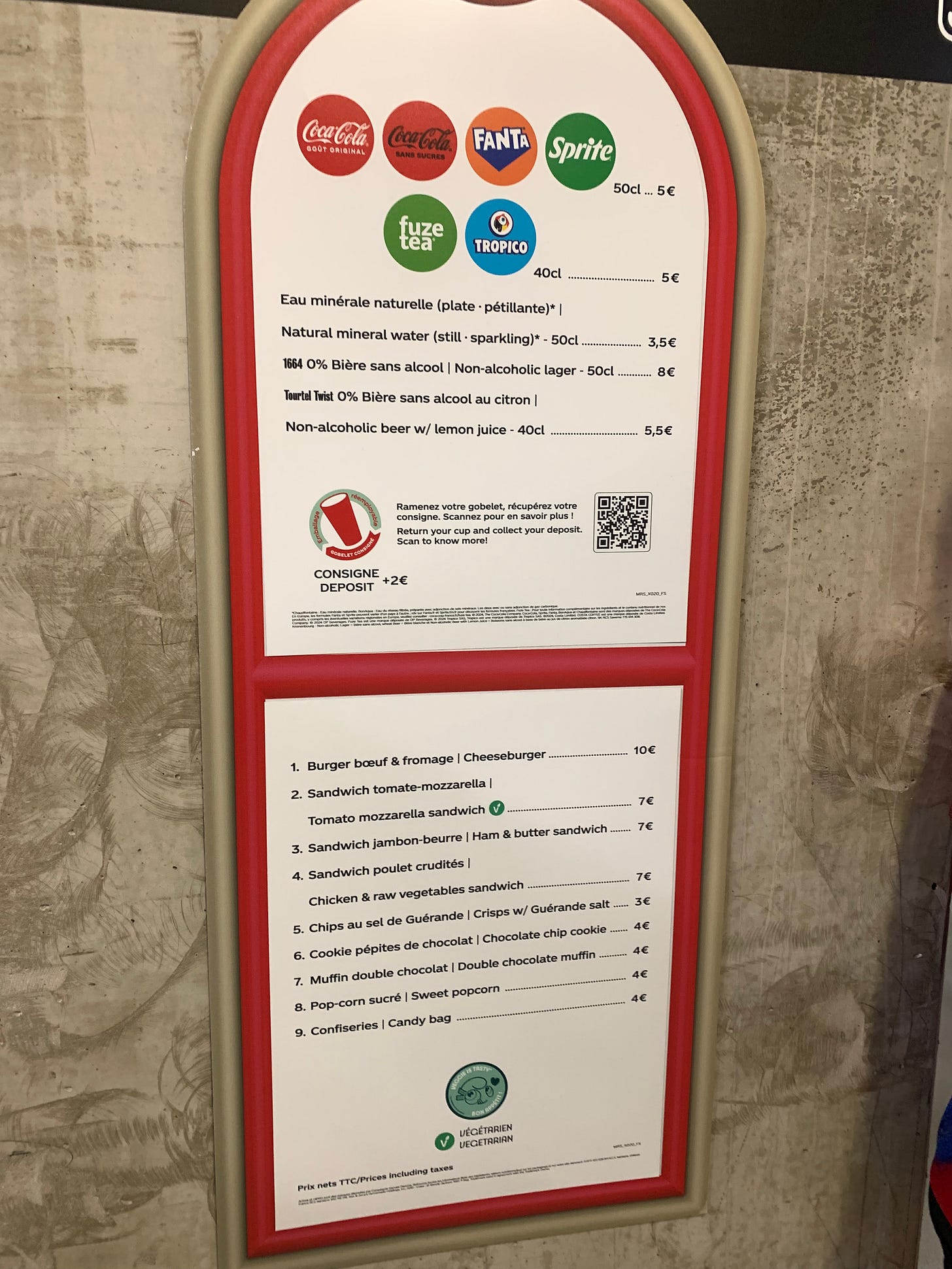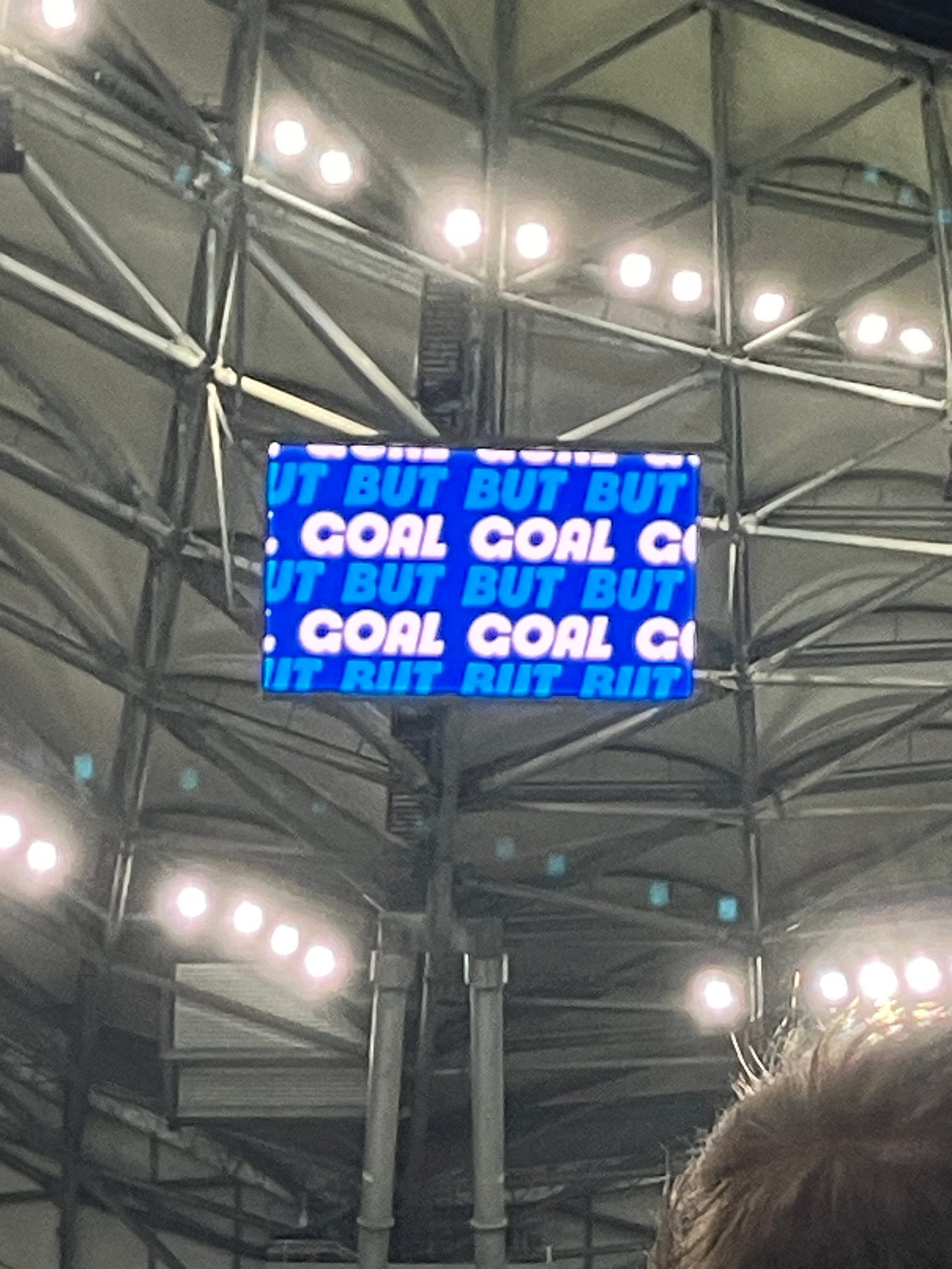Just after Simone Biles has won the all around gold in Women’s Gymnastics, we’re all probably thinking a bit about the Olympics. And although I didn’t get to witness any of her explosive tumbling in person or on TV (La Borie doesn’t have one), I did get a taste of the Olympic magic, thanks to the persistence of my eldest daughter.
She had wanted to see the Opening Ceremonies while we were in France. Driving to Paris from my Aunt’s house takes about nine hours, and so I had no interest. Especially because Paris is unbearably crowded in the Summer even when there isn’t a weeks-long international spectacle taking place along the Seine. No Merci!
But then my daughter found that one of the Olympic soccer matches was taking place at the Orange Velodrome in Marseilles, only a half hour drive from La Borie. Who’s playing? US vs. France? On Y Va!
I was genuinely excited about the match because I am such a softy for good old fashioned American patriotism. I used to always get a little injection of nationalism each summer when my town presented its Mayberry-like Fourth of July Celebration. The scouts would three-finger salute while running Old Glory up the flagpole, octogenarian rotarians flipped runny pancakes, American-made convertibles paraded village VIPs down main street, and city staff would try their fastballs at the dunk-the-mayor water tank. This small town apple pie is almost too sweet to eat.
But COVID and the current partisan political climate have somehow changed Mayberry. Now when I express pride for my country, it’s either misinterpreted as patriarchal arrogance, populist nonsense, or a nefarious dog whistle. Quelle horreur!
This is why I think the Olympics are so good for my little town, and all of America right now. We now have a cause we can all get behind. I can cheer for my country with unrestrained patriotism with no greater motive than hoping that one of eleven players kicks a ball through a box without using his hands. Go Team USA!
Of course, I knew enough about soccer to recognize that our chances for victory were slim. For the very few more ignorant of the game than I, France knows its way around the soccer pitch. In fact, the French have won several World Cups, and the current team is bursting with the best players in the world. The US men’s team? Let’s just say, they’re still a work in progress. But one can dream, and Olympic miracles can happen.
On the day of the game, we arrived early, anticipating getting stuck in the traffic snarled streets of Marseilles. After a spirited wall from a carpark more than a mile away, the Stade Velodrome came into view. Its profile, a contemporary architectural statement, complete with undulating roof line, a wide curtain draping over the upper half of the building. The lower arcade is bare, exposing the concrete and steel superstructure.
Despite the modern industrial elegance, there is a subtle tribute to the oval amphitheaters of ancient France, like the totally intact Roman stadium at Nimes. And when we walked up to our designated arched entrance to show our tickets, I felt like I was entering the colosseum in Rome rather than Sofi or Allegiant back at home.
The interior of the stadium was a simple, brutalist design; unadorned concrete, sharp edges, walls that looked more like stone remains of the arena at Arles than a modern, multi million dollar sports facility. The gray starkness was broken up by austire announcements, Defence de Fumer, Cours 4B, Rafraîchissements. Yet, missing was the branding, advertising or team promotions found on every vertical space at similar US stadiums.
When I stepped out into the stands, I saw the wing-like roof soaring above me, a beautiful wave of steel and composite ebbing and flowing above the seats with a generous opening to the sky. Another homage to the Romans, who would have called this a velarium shielding the spectators from the sun. It was like they’d spent all the money on renovations to the roof, and left the guts alone.
The seats were stoically simple. There were only aisles leading down to the field. To cross rows, you had to squeeze in front of seated guests. Folks pulled up their legs as we crossed in front of the blue plastic non-folding seats–they reminded me of the chairs in my elementary school. Je suis desole.
We found our seats just as they were announcing the French team taking the field. The entire arena erupted in cheers, folks gesticulated with red, white, and blue banners. Their hand-held pennants created aggregate French Flags that appeared to billow across the stands.
The game hadn’t yet started, nor had we eaten dinner, so my wife took the kids to check out the rafraîchissements. As you can imagine, French stadium food is far superior to anything I’ve eaten at Angel Stadium: sandwich caprese, poulet crudités, jambon-beurre. But the most surprising part of the menu was the price. There wasn’t a item that cost more than ten euros. When a Dodger dog and a beer will set you back $30 bucks, and nachos run you $21 at Angel Stadium, one starts to appreciate how expensive things have gotten in the US relative to much of the world, especially when it comes to food. The five of us got a meal and drink for less than $50 bucks.
The first half of the match was unremarkable in terms of scoring, but fascinating in terms of the fans. Cheering in France feels much more civilized than the US. They sing and chant like American high school fans. There are songs and riffs, and sometimes echoes or responses from across the stadium. Now, don’t get me wrong, the French fans can be ruthless, and sometimes downright crude. But today, there was a childlike celebration for the home team.
On the other hand, I was the fan acting uncouth, mistakenly instinctually when the Americans made a good play. In an ironic case of culture clash, whistling in France (and much of Europe) is reserved for criticism of the home team, or challenging a bad call by the ref. Since my team was playing poorly, it simply looked like I was chastising them for a scoreless half.
For the most part, people had remained in their seats for the entire 45 minute period. But, once the whistle blew for “mi-temps,” the stadium vibrated with activity. Just like in the US, folks scurried to the snack bar or bathroom, trying to beat the crowds.
I must say, for a country that loves its tobacco, I was surprised to see no smoking signs all around the open air stadium. And, for the most part, no one was smoking during the game. But between halves, folks couldn’t wait any longer. They simply stood fidgeted in their pockets, and started lighting up. I even saw several fans standing around a no smoking sign with cigarettes in their mouths. It appears that “no smoking” in a French stadium simply means, while seated.
The second half was as bloody as a Roman gladiator event. The French scored three times in quick succession, and our chances for victory evaporated. Although I had known it would be a long shot, I was still disappointed by the thought that we weren’t going to advance.
The US did score a single goal late in the game, that was almost immediately called offsides. But being an ignorant American, I began embarrassingly gesticulating like a crazed fan shouting “GOOOOOOAL!!!!! and dancing in my seat until an elderly woman tugged at my shirt, pleading for me to sit down. Little did I know she was trying to save me any shred of dignity. Everyone else knew the goal had never counted.
The walk to the car was a slow and quiet one, as we all reflected on how good the first half of the match had gone. No one likes to see their team lose.
And then my daughter asked to go to the bathroom. It was 11:30pm, and most of the buildings in this part of Marseille were closed. The few half-empty restaurants trying to snag a patron or two wouldn’t allow us to use the toilet without eating.
That’s when my wife saw a McDonald’s up ahead. There’s always a clean bathroom at the golden arches.
The girls practiced their fFrench by asking for a code to open the bathroom door, and we sat in the dining area watching a line grow through the restaurant and out into the street, spectators pouring in to buy a late-night snack.
Not a single one of them was American.
I reflected on how odd it was that all the French restaurants were empty at this time of night, but here was the bastion of American capitalism having its moment at the end of a French victory on the pitch. Who had really won tonight? Was this the patriotic moment I was looking for? The agony of victory never tasted so salty.









Insightful observation!